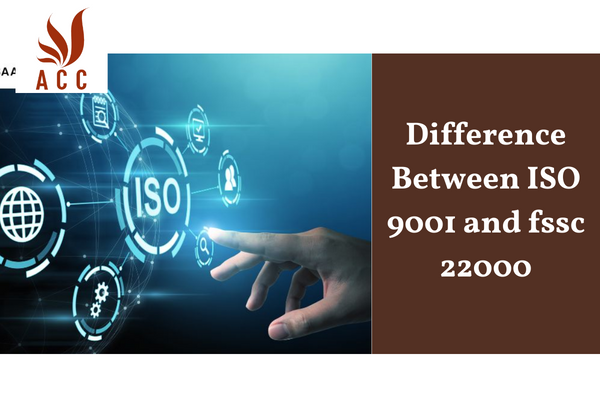ISO 9001 and FSSC 22000 are two of the most common food safety management system (FSMS) standards in the world. Both standards provide organizations with a framework for ensuring the safety of their food products, but there are some key differences between the two. In this blog post, we will take a closer look at the similarities and differences between ISO 9001 and FSSC 22000. We will also discuss which standard is right for your organization.

Difference Between ISO 9001 and fssc 22000
1. Scope
ISO 9001 is a generic quality management system standard that can be applied to any organization, regardless of its industry. FSSC 22000 is a food safety-specific standard that is specifically designed for organizations that produce, process, pack, store, transport, distribute, or sell food.
2. Requirements
ISO 9001 focuses on the general principles of quality management, such as customer focus, leadership, and continuous improvement. FSSC 22000 builds on these principles and adds specific requirements for food safety, such as hazard analysis and critical control points (HACCP) and prerequisite programs (PRPs).
3. Structure
ISO 9001 is organized around 10 clauses that cover the following topics:
- Scope
- Normative references
- Terms and definitions
- Management responsibility
- Resource management
- Product realization
- Measurement, analysis, and improvement
FSSC 22000 is organized around 12 clauses that cover the following topics:
- Scope
- Normative references
- Terms and definitions
- General requirements
- Management responsibility
- Resource management
- Product realization
- Monitoring and measurement
- Control of nonconforming products
- Corrective and preventive actions
- Improvement
- Management review
4. Certification
Both ISO 9001 and FSSC 22000 can be certified by independent third-party organizations. However, FSSC 22000 is based on the GFSI (Global Food Safety Initiative) scheme, which is recognized by many major retailers and foodservice companies.
5. Benefits
Organizations that implement ISO 9001 or FSSC 22000 can benefit from a number of advantages, including:
- Improved food safety
- Increased customer satisfaction
- Reduced costs
- Enhanced compliance
- Increased market access
Which standard is right for you?
The best standard for you will depend on your specific needs and requirements. If you are looking for a generic quality management system standard that can be applied to any organization, ISO 9001 is a good option. If you are looking for a food safety-specific standard that is recognized by major retailers and foodservice companies, FSSC 22000 is a better choice.
Here is a table that summarizes the key differences between ISO 9001 and FSSC 22000:
| Feature | ISO 9001 | FSSC 22000 |
|---|---|---|
| Scope | Generic quality management system | Food safety-specific |
| Requirements | General principles of quality management | Specific food safety requirements |
| Structure | 10 clauses | 12 clauses |
| Certification | Can be certified by independent third-party organizations | Based on GFSI scheme |
| Benefits | Improved food safety, increased customer satisfaction, reduced costs, enhanced compliance, increased market access |
Improved food safety, increased customer satisfaction, reduced costs, enhanced compliance, increased market access |
ISO 9001 and FSSC 22000 are both valuable standards that can help organizations improve their performance. The best standard for you will depend on your specific needs and requirements.
Nội dung bài viết:






Bình luận